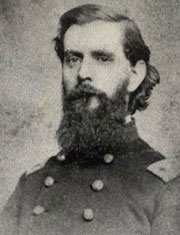William Harvey Lamb Wallace (1821-1862)
William Harvey Lamb Wallace, born on July 8, 1821 in Urbana, Ohio, moved with his family to Illinois in 1834, where he was educated at Rock Springs Seminary in Mount Morris. On his way to study law with Abraham Lincoln in Springfield in 1844, Wallace was persuaded by local attorney T. Lyle Dickey, a close friend of Lincoln, to join his practice in Ottawa instead, becoming licensed to practice in 1846. Wallace eventually married Dickey's daughter, Martha Ann, in 1851.
 In 1846 he volunteered as a private in the 1st Illinois regiment for the Mexican war. He rose to the rank of adjutant, participated in the battle of Buena Vista and other engagements, and after the peace resumed his profession, becoming district attorney in 1853.
In 1846 he volunteered as a private in the 1st Illinois regiment for the Mexican war. He rose to the rank of adjutant, participated in the battle of Buena Vista and other engagements, and after the peace resumed his profession, becoming district attorney in 1853.
When the Civil War broke out, both Wallace and Dickey immediately volunteered for service with the 11th Illinois, which assembled in Springfield. Wallace was elected as the unit's colonel in May 1861. A successful lawyer, a friend of President Lincoln, a generation older than most privates, and an officer with Mexican War experience, he was entirely suited for such command.
Wallace commanded a brigade in General John A. McClernand's division at the battle of Fort Donelson, in February, 1862, and was appointed brigadier general for his performance, the first notable Union victory in the Civil War. Wallace's troops had saved the day, although the 11th Illinois had lost nearly two-thirds of its men. He then moved with his troops to Pittsburg Landing, Tennessee, where Confederates launched a surprise attack on the forces of Major General Ulysses S. Grant at Shiloh Church on Sunday, April 6, 1862. Wallace, who held only temporary command of one of Grant's six divisions, fought bravely but was mortally wounded as he began to withdraw his men on the afternoon of the battle. His wife, who had arrived at Pittsburg Landing by steamer on the day of the battle, was at his side when he died three days later. Grant praised Wallace in 1868 as "the equal of the best, if not the very best, of the Volunteer Generals with me at the date of his death."
 In 1846 he volunteered as a private in the 1st Illinois regiment for the Mexican war. He rose to the rank of adjutant, participated in the battle of Buena Vista and other engagements, and after the peace resumed his profession, becoming district attorney in 1853.
In 1846 he volunteered as a private in the 1st Illinois regiment for the Mexican war. He rose to the rank of adjutant, participated in the battle of Buena Vista and other engagements, and after the peace resumed his profession, becoming district attorney in 1853.